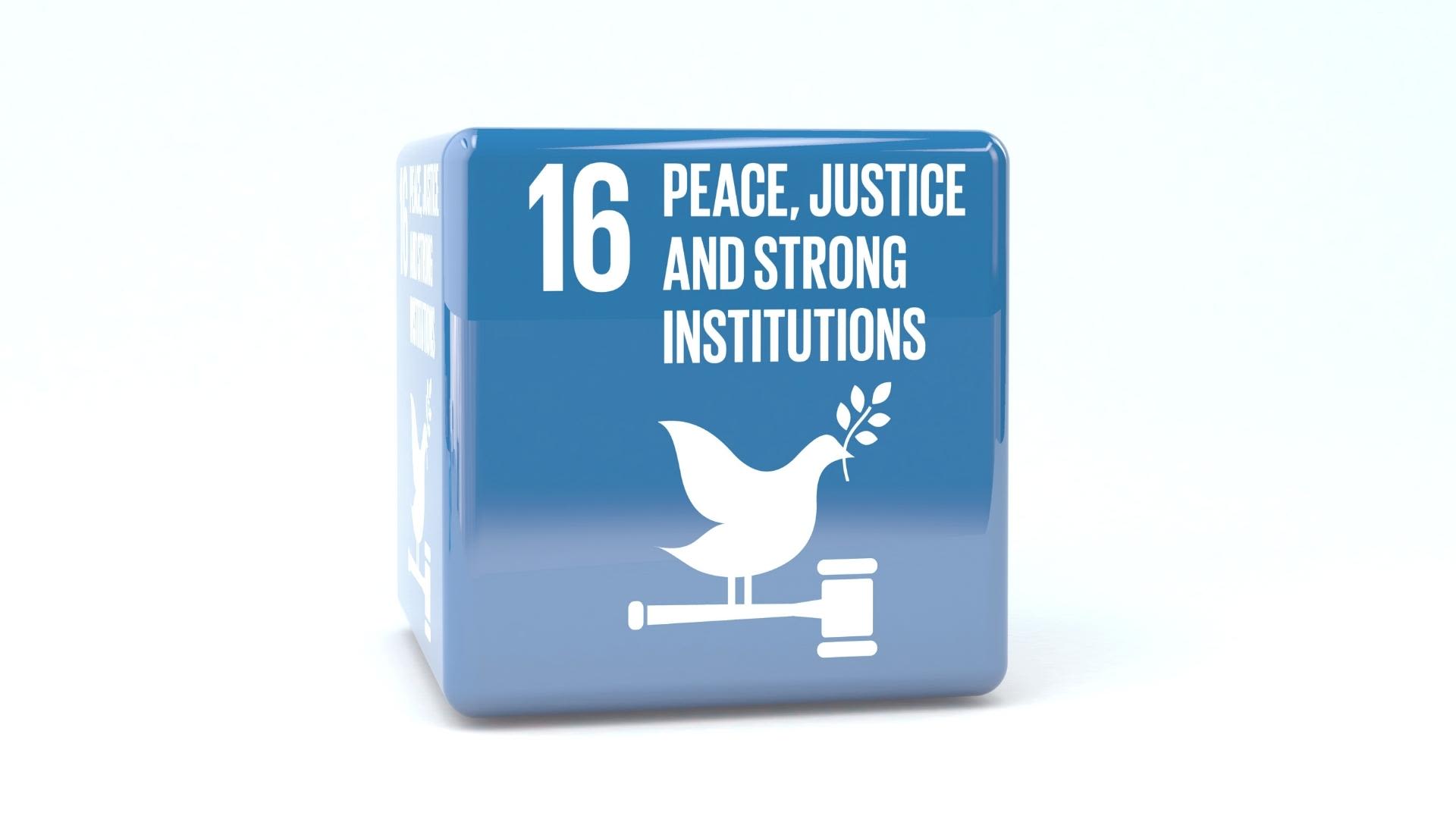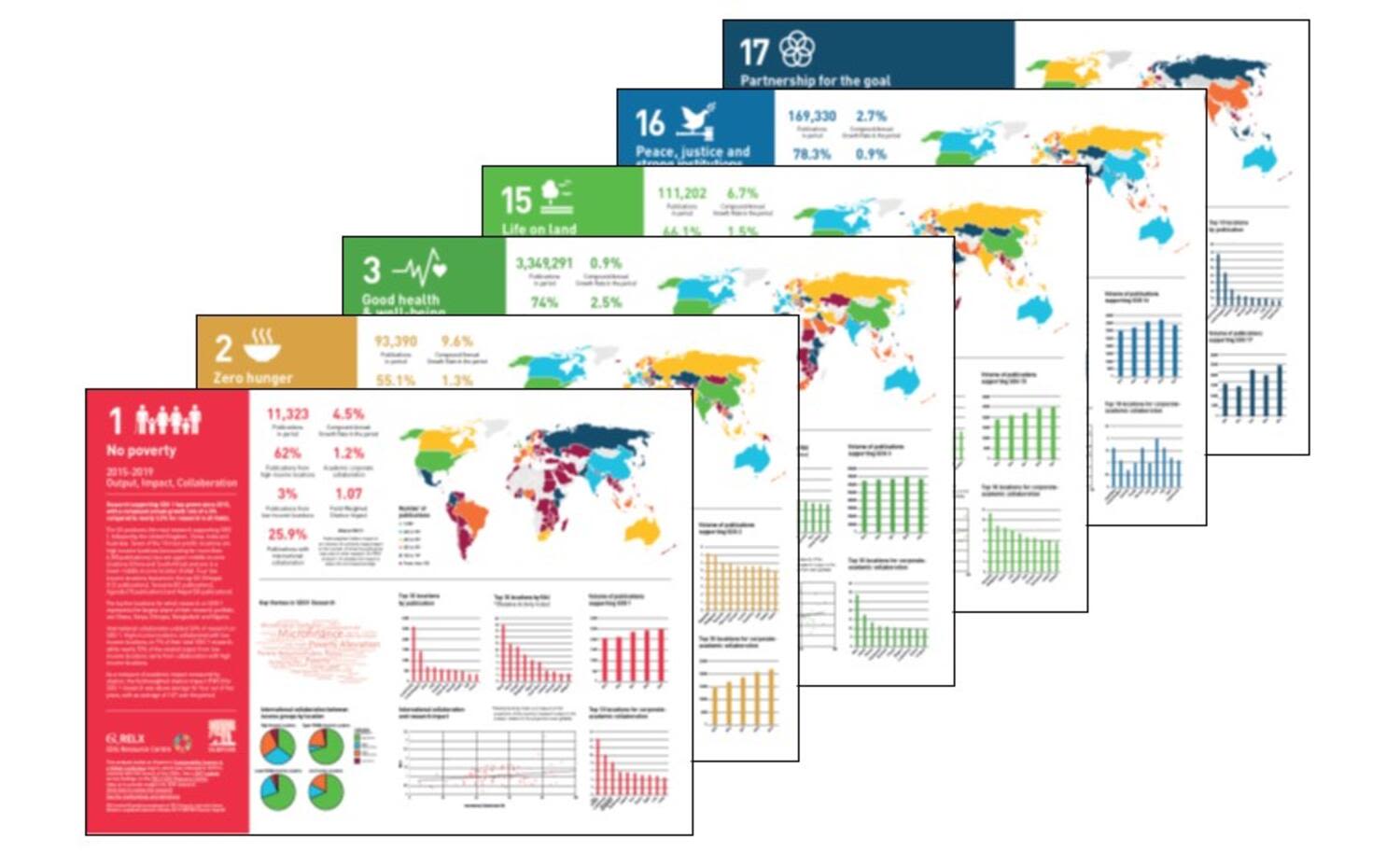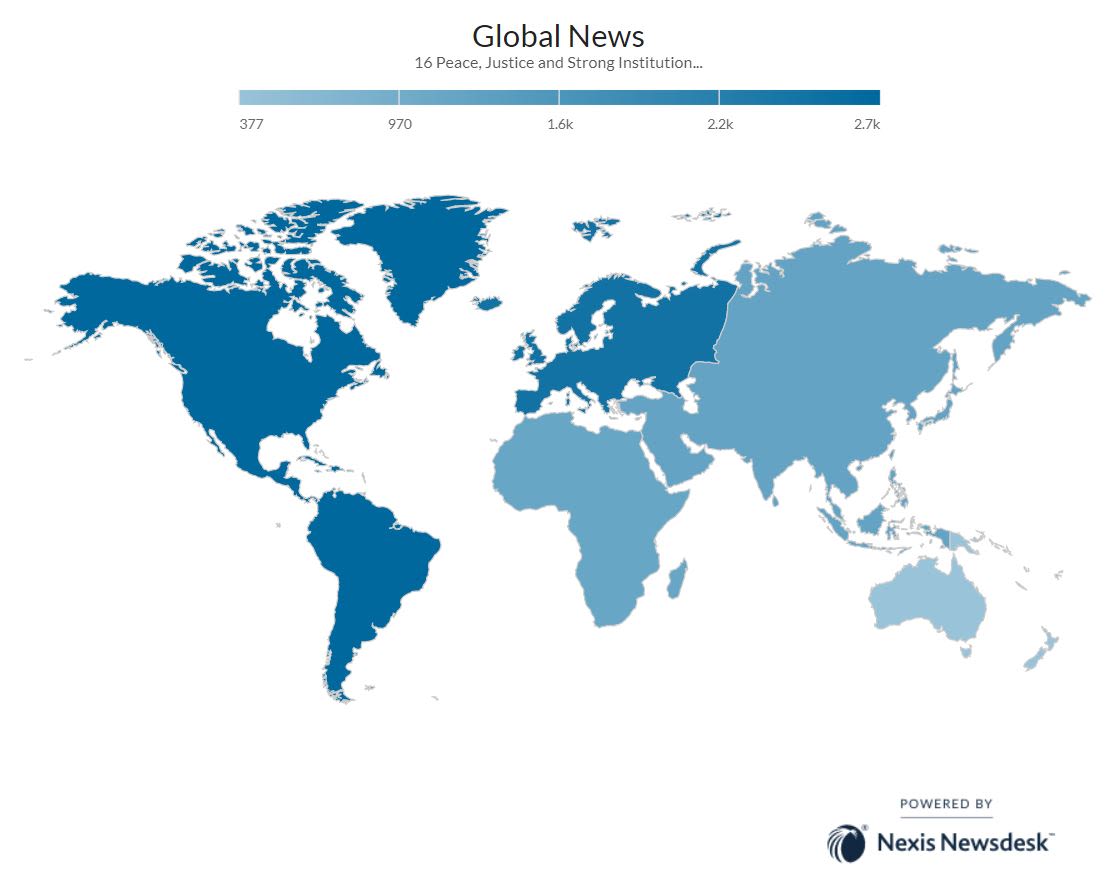SDG 16

PROMOTE PEACEFUL AND INCLUSIVE SOCIETIES FOR SUSTAINABLE DEVELOPMENT, PROVIDE ACCESS TO JUSTICE FOR ALL & BUILD EFFECTIVE, ACCOUNTABLE AND INCLUSIVE INSTITUTIONS AT ALL LEVELS

“We are determined to foster peaceful, just and inclusive societies which are free from fear and violence. There can be no sustainable development without peace and no peace without sustainable development.”
This statement, which precedes the 2030 Agenda for Sustainable Development declaration, highlights the importance of the Sustainable Development Goal 16 (SDG16), which deals with all forms of violence – both direct, such as war crimes and physical abuse of women and children, and indirect, such as business bribery and lack of access to justice.
With 12 targets, SDG 16 addresses the root causes of violence and conflict by pursuing results that enable the world to become a safer place for each and all of us. At the same time, SDG 16 seeks to establish a legal environment that facilitates the implementation of all 17 Sustainable Development Goals.
The SDG 16 is about people walking in their neighborhoods without fear, children growing up without abuse, the end of illicit arms flow, the end of corruption. It is about accountability, transparency, about access to information and to the protection of the rule of law. It is about bringing people like Rosnah into society, rather than leaving her in the fringes.
Rosnah was born in the middle of the Borneo jungle, in Malaysia. Aged 16, she had attended local school classes but was unable to take exams because she couldn’t prove her identity. Her life changed the day she received her birth certificate. That basic legal document most of us take for granted meant Rosnah was finally identified as a citizen and, as such, could access social services and benefit from the rule of law.
About 57 percent of the world’s population live outside the umbrella protection of the rule of law. That’s 5bn people struggling for basic human rights on a daily basis.
To bring this number down to zero is part of RELX's mission. In order to achieve that, we have enlisted a number of the companies gathered under our umbrella, with LexisNexis Legal & Professional at the forefront of our initiatives related to SDG 16.
LexisNexis Legal & Professional employs around 11,000 people serving customers in more than 150 countries. Everything it does as a business advances the rule of law around the world. We believe that the rule of law is the foundation for the development of peaceful, equitable, and prosperous societies.

We have found that if rule of law strengthens by 10% around the world, then…
- Crime would drop by 30%
- GDP would increase by more than $7,000 per person
- Infant mortality would improve by more than 30%, saving millions of children’s lives
- Life expectancy would increase by more than 2 years
We think this is a future worth our focus.

How we are advancing the rule of Law

To leverage our global work around the reach and strengthening of the rule of law, we congregated our initiatives in the LexisNexis® Rule of Law Foundation. In its simplest form, the rule of law means 'no one is above the law'.
We think of it as having four main components...

Equality Under the Law
All people, businesses and governments are accountable, and the law applies to everyone in the same way, no matter who you are.

Transparency of Law
Laws must be clear, precise, affordable and accessible while protecting fundamental human rights.

Independent Judiciary
An independent judiciary ensures equality and fairness of law between people and public officials.

Accessible Legal Remedy
There must be access to timely resolution in a court of law.
Working with partners, the LexisNexis foundation endeavors to accelerate the extension of the rule of law to all nations by putting information and technology in the hands of those who can bring about change. That’s the ultimate goal of our projects.
Deploying technology to foster equality for all under the law
eyeWitness to Atrocities app
Innovation is present in all parts of RELX. To extend the rule of law to all countries and peoples of the world, we are employing our most advanced technology, and already seeing great results.
One of our tools is the eyeWitness to Atrocities App.
According to the United Nations, by the end of 2020, a quarter of the global population was living in conflict-affected countries. That was before the war in Ukraine, where war crimes and atrocities are pictured daily by the media.
Together with the International Bar Association, LexisNexis launched the eyeWitness to Atrocities App in 2015. It’s the first app that documents and safeguards images in a secure and verifiable way so that they can be used as evidence in a court of law. eyeWitness users have captured over 65,000 photo, video, and audio files across high-risk regions to date. eyeWitness supports more than 68 organisations worldwide in documenting atrocities, and 71 dossiers have been submitted to accountability mechanisms so far.
Photos captured with the app helped convict two high-ranking military commanders from the Democratic Republic of Congo of murder and torture, consisting of crimes against humanity. Photos included images of mass graves and survivors. Showing these in court was the turning point. All 100 victims were awarded significant reparations. This set an important precedent for future atrocity crime trials.

Rule of Law Impact Tracker
Another tool developed by LexisNexis is the Rule of Law Impact Tracker. It provides a unique way for users to visualize the impact of the rule of law advancement.
Using data collected by the World Justice Project, the tracker quantifies the relationship between the rule of law and economic and social progress. Countries with stronger rule of law scores perform better in measures of life expectancy, civil liberty and happiness, as you can see in our interactive tool.



Hands-on, from global to local
Mobile Courts of East Malaysia
When the most vulnerable citizens of a country can’t afford to go to court, we bring the court to them and provide access to legal remedy.
Our Malaysian LexisNexis team ventured into the jungles of Borneo as part of a mobile court. The mission was to allow access to citizenship, and therefore state institutions, for remote people. They slept in tents by night and ran the court by day. Rosnah, the young girl born in this part of the world, was just one of the 220 cases they handled.

Around the world entire families, often spanning generations, are stateless and undocumented. Those who are unable to prove their nationality pass on their “status” to their children, and so on. Of the nearly 7.9 billion people in the world, an estimated 10 million are stateless, half of whom are children. A staggering 800,000 persons are estimated to be undocumented in Sabah, East Malaysia.

SDG-related research
Elsevier, another RELX company, gathers and analyzes research data on the SDGs and displays the results in graphics.

For SDG16, the analysis of research between 2015 and 2019 yielded interesting results among middle- and low-income countries.
Six low income locations feature in the top 50 countries with the highest number of publications:
- Uganda – 284 publications
- Ethiopia – 194 publications
- Tanzania – 163 publications
- Nepal – 128 publications
- Rwanda – 103 publications
- Malawi – 58 publications
Rwanda, Uganda, Palestine, Zimbabwe and South Africa are the top five locations for which research on SDG16 represents the largest share of their research portfolio. Of the total research conducted by low income countries, nearly 73% of the related output came from collaboration with high income countries.
Eight of the ten most prolific locations, accounting for more than 111,300 publications, are high income countries. About 37% of their total SDG16 research involved collaboration with low income locations. Such partnerships can help build capacity in low income countries.
The United States leads the list of publications supporting SDG16, followed by China, the United Kingdom, Germany and Australia.
Overall, research supporting SDG 16 has grown since 2015, with a compound annual growth rate of 2.7% compared to nearly 3.5% for research in all fields. As a measure of academic impact assessed by citation, the field weighted citation impact (FWCI) for SDG16 research was above average every year, with an average of 1.04 over the period.
It’s been a global effort, also in locations that need most the rule of law.

News tracker
Mobilization around SDG 16 by governments and civil society organizations started to have a positive impact on some of the sad indicators of violence around the world. In the last three years, however, progress slowed or, in some cases, stalled. Part of the reason behind that was the Covid pandemic.
The progress on indicators are reported by the United Nations. To allow the public to follow progress, and witness history in the making, RELX developed the SDGs World News Tracker, which aggregates up-to-the minute news about the Sustainable Development Goals from around the world in the six UN languages (Arabic, Chinese, English, French, Spanish, and Russian), as well as German. The tracker searches millions of articles published daily across more than 75,000 news sources and display the results in an interactive map.
Our News Tracker covers all 17 SDGs.


Digital inclusion can bring legal inclusion
Once again, things we take for granted are far from reality in many corners of the world. Digitalization of documents is one of them.
In Sierra Leone, we found out that legal aid workers could only access one set of law books, which were being sent back and forth across the country.
So, we digitized the books and provided 24/7 access to those laws. Now, with access to digital laws, they’ve been able to triple their case load and dramatically expand access to justice across the country.
LexisNexis databases provide transparency into the law in more than 150 countries, reaching billions of people. Transparency of law is a crucial step to achieve SDG 16.
We will continue to expand these resources rapidly until all the world’s laws are visible and accessible to its citizens.

Recognition
Mike Walsh, CEO of LexisNexis Legal & Professional, was honoured by the United Nations Foundation as a Global Leader for his work in advancing the rule of law around the world. The Award honours the vision of the founders of the UN: to save future generations from the scourge of war, reaffirm faith in human rights and equal rights, ensure justice and international law, and promote social progress and freedom.
Previous honorees included Malala Yousufzai, Desmond Tutu, Ban Ki-moon, Barack Obama, Angelina Jolie, and Oprah Winfrey.
Ban Ki-moon, the eight Secretary-General of the UN said “I’d like to commend Mike Walsh on his Award from the United Nations Foundation for Global Leadership in advancing the rule of law around the world. Mike and the committed team at LexisNexis have been at the forefront of using their core competencies as a business, innovation, and creativity to strengthen the rule of law in the 150 markets where the company operates. Mike is a leader who understands that societies without a predictable legal framework are societies where people do not invest in their future, or the future of their country, and that businesses do better when the world does better. He’s shaped a powerful mission for LexisNexis to advance the rule of law for a better future and to support peace and progress as a result.”
"Our work is ongoing. It is not a foregone conclusion that rule of law institutions will function well. If justice is out of reach, citizens suffer, and we are all at risk. Rule of law is a bedrock of freedom, vital for building peace and prosperity."
This is why our people and core business operations are helping advance the rule of law around the world.




